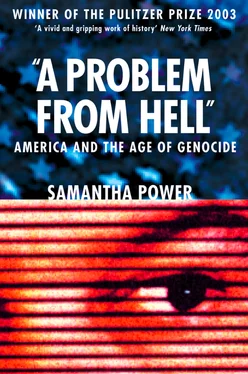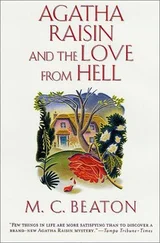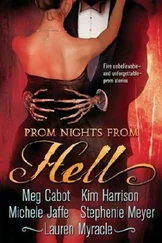The key ideological premise that lay behind the KR revolution was that “to keep you is no gain; to kill you is no loss.” 84Liberal societies preach a commitment to individual liberty embodied in the mantra, “Better ten guilty men go free than one innocent man be convicted.” Khmer Rouge revolutionary society was predicated on the irrelevance of the individual. The KR even propagated the adage, “It is better to arrest ten people by mistake than to let one guilty person go free.” 85It was far more forgivable to kill ten innocent men than to leave one guilty man alive, even if he was “guilty” simply of being less than overjoyed by the terms of service to Angkar .
Soon after the fall of Phnom Penh, Henry Kamm of the New York Times visited three refugee camps at the Thai border, none of which was in contact with the others. He wrote a long piece in July 1975, which the paper accompanied with an editorial that compared the Khmer Rouge practices to the “Soviet extermination of kulaks or…the Gulag Archipelago.” 86In February 1976 the Post’s David Greenway filed a front-page story describing the harsh conditions. “For Westerners to interpret what is going on is like the proverb of the blind men trying to describe an elephant,” Greenway wrote. “Skepticism about atrocity stories is necessary especially when talking to refugees who tend to paint as black a picture as they can, but too many told the same stories in too much detail to doubt that, at least in some areas, reprisals occurred.” 87Collectively, although all were slow to believe and none gave the terror the attention it deserved, diplomats, nongovernmental workers, and journalists did gather ghastly accounts of death marches, starvation, and disease in 1975 and 1976. The media did not lead with these reports, and the politicians did not respond to them, but the stories did appear.
The most detailed and eventually the most influential examination of KR brutality was prepared by the French priest François Ponchaud. Ponchaud, a Khmer speaker, had lived in Cambodia for ten years before he was evacuated from the French embassy in early May 1975. He debriefed refugees at the Thai border and then later in Paris, and he translated Cambodian radio reports. In February 1976, less than a year after the Khmer Rouge seized power, Le Monde published his findings, which said some 800,000 had been killed since April 1975. 88For Elizabeth Becker, then a metro reporter in Washington, this was enough. “As soon as his stories came out, I believed,”she recalls. “You have to know your shepherds. In Cambodia the French clerics had lived the Khmer life, not the foreigners’ life. It took Ponchaud to wake the world up.” Soon thereafter, a former KR official came forward in Paris claiming to have helped execute some 5,000 people by pickax. He estimated that 600,000 had already been killed. 89In April 1976, a year into the Khmer Rouge reign, Time ran a story, soon followed by other accounts, that included graphic drawings of the executions and described Cambodia as the “Indochinese Gulag Archipelago.” “A year after the takeover, Cambodia is still cocooned in silence—a silence, it is becoming increasingly clear, of the grave,” Time wrote. “There is now little doubt that the Cambodian government is one of the most brutal, backward, and xenophobic regimes in the world.” 90
Even when the diplomats, journalists, and relief workers no longer assumed the Cambodians were exaggerating, it was another step entirely for them to move along the continuum toward understanding. One need only recall the exchange during World War II between Polish witness Jan Karski and U.S. Supreme Court justice Felix Frankfurter in which Frankfurter told the eyewitness, “I do not mean that you are lying. I simply said I cannot believe you.” Holocaust survivor Elie Wiesel has spoken of the difference between “information” and “knowledge.” In Cambodia observers had initially resisted certifying the refugee accounts even as “information.” The words were available, describing death marches, roadside executions, and the murder of the rich, the intellectuals, and even office assistants. But the first photos were not smuggled out of Cambodia until April 1977, and they depicted harsh, forced labor conditions but not the systematic elimination of whole ethnic groups and classes. 91With the country sealed tight, statesmen and citizens could take shelter in the fog of plausible deniability. But even once they accepted the information, the moral implications of that information did not really sink in. For those back in Washington, 10,000 miles from the refugee camps at the Thai border, it would take years to promote the raw, unconfirmed data to the status of knowledge.
Response
Options Ignored; Futility, Perversity, Jeopardy
Those who argued that the number of Cambodians killed was in the hundreds of thousands or those who tried to generate press coverage of the horrors did so assuming that establishing the facts would empower the United States and other Western governments to act. Normally, in a time of genocide, op-ed writers, policymakers, and reporters root for a distinct outcome or urge a specific U.S. military, economic, legal, humanitarian, or diplomatic response. Implicit indeed in many cables and news articles, and explicit in most editorials, is an underlying message, a sort of “if I were czar, I would do X or Y.” But in the first three years of KR rule, even the Americans most concerned about Cambodia—Twining, Quinn, and Becker among them—internalized the constraints of the day and the system. They knew that drawing attention to the slaughter in Cambodia would have reminded America of its past sins, reopened wounds that had not yet healed at home, and invited questions about what the United States planned to do to curb the terror. They were neither surprised nor agitated by U.S. Apathy. They accepted U.S. noninvolvement as an established background condition. Once U.S. troops had withdrawn from Vietnam in 1973, Americans deemed all of Southeast Asia unspeakable, unwatchable, and from a policy perspective, unfixable. “There could have been two genocides in Cambodia and nobody would have cared,” remembers Morton Abramowitz, who at the time was an Asia specialist at the Pentagon and in 1978 became U.S. ambassador to Thailand. During the Khmer Rouge period, he remembers, “people just wanted to forget about the place. They wanted it off the radar.”
From the mountains of Vietnam, foreign service officer Ken Quinn had spotted early indicators of the Khmer Rouge’s brutality back in 1974 and had since been rotated back to the United States, where he served as the Indochina analyst at the National Security Council. Quinn remembers the impossibility of generating constructive ideas after the U.S. withdrawal from Vietnam:
The country was in a state of shock. There was a great sense that we were powerless. We were out. We were done. We had left. It was painful, but it was over…Vietnam had been such an emotional, wrenching, painful experience that there was just a huge national relief and a sense the country needed to be put back together. Our country.
Those who retained curiosity about the region continued to do so with the aim, in military parlance, of “fighting the last war.” Most observers remained unable or unwilling to look at events as they transpired or to see Cambodia as anything other than a stepchild of Vietnam. They interpreted events on the ground accordingly. As Becker later wrote:
Too many people in and out of government had staked their reputations, their careers, and their own self-esteem on the positions they took during the [Vietnam] war. Each side wanted the postwar era to shore up those old positions and prove them correct. News was [seen]…as potential ammunition against old American opponents, as proof of America’s guilt or honor. 92
Читать дальше












